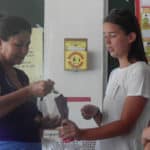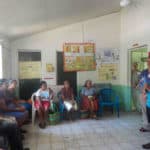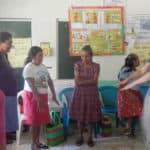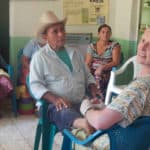Aesop is credited with the first use of the idiom ‘familiarity breeds contempt’ as the moral in the fable The Fox and the Lion. This past week I pondered that adage as each morning I drove out to the small village of Guachipilincito to pick up a few of the Brown / Wingate residents and students and transport them to our clinic and our health center in Concepción. The drive is only about seven kilometers either way, and yet it takes over one-half hour out and in. It is not exactly a road as one normally considers a road. The jagged ledge designed to puncture tires, gaping holes, loose gravel, and boulders to be circled about, demand maintaining the vehicle in first gear and four wheel drive for the entire trip. Beyond that, there is the frustrating, anxiety creating long pauses behind herds of cattle or the inability of two vehicles passing in opposite directions. By the end of the week, I knew that Aesop had got it right: my familiarity of the road only heightened my loathing of the trip.
Brown built the clinic in Guachipilincito and has been coming to the secluded village for years. Wingate School of Pharmacy has partnered with them in more recent years. Though for many of the students and residents, their present brigade is their first experience of the town and its residents, for the leaders and the institutions, Guachipilincito is familiar territory. The townsfolk know them and appreciate their visits. Here, familiarity has not bred contempt, but rather something truly amazing that defies a simple explanation.

Familiarity here seems to have bred a sense of mutual respect and a profound sense of commitment in service. While medical treatment within the local community is the ostensible purpose of the service trip, the team is deeply invested in the wellbeing of the local residents and the larger population. The highly motivated Brown / Wingate team is assessing and treating all the children and adults in the community, offering dental services, feeding children under age 5 years through their nutrition program, and taking a census to discern service needs. Beyond the local community, Brown / Wingate is engaging the wider community. Students, residents, doctors, and other medical professionals are visiting the main clinic and health center in Concepción, working side by side with our Honduran medical staff, professionally sharing and developing more effective, meaningful models of care. At home visits, at the clinic delivering babies, in emergency situations, students and residents see what medical care entails, and Honduran professionals benefit from the knowledge and experience of seasoned and accomplished medical professionals.
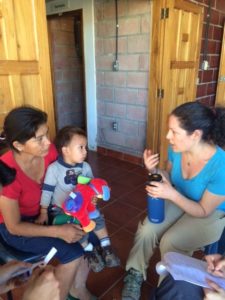
A very special aspect of this brigade has been the presence of child psychiatrist, Dr. Horacio Hojman. Originally from Argentina, Dr. Hojman now practices in Rhode Island and Massachusetts. His treatment of Honduran children and adolescents with psychological challenges was ground breaking, as mental illness is not readily discussed in this area of Honduras. Beyond this, he has been offering professional workshops for medical personnel and teachers such that children will find help and support on a continual basis. We certainly hope that this will be only the first of many visits from Dr. Hojman.

Brown / Wingate has committed to three weeks in February for this brigade. Many participants have already left after the first week, yet much more is still planned for the weeks ahead. Another professional sharing day is scheduled and other meaningful work. What marvelous things they have already accomplished in their ardent commitment to a relationship with a small, isolated community in the backwoods of Honduras. The road to get there is challenging, grueling really, but they have not grown contemptuous from the familiarity of the journey. Instead they have recognized that familiarity, coupled with a committed relationship of service, breeds the dawning of hope.
Article by: Paul Manship and Angela McCaskill Photographs courtesy of Paul Manship and Angela McCaskill


